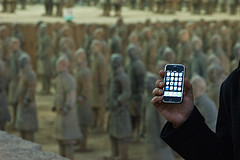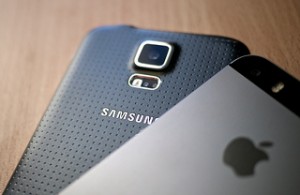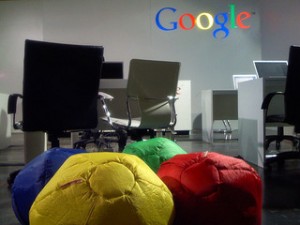 Apple is facing a problem that is certainly not new to the world of branding and international trademarking. There are over one billion people in China, and many of them desperately want an iPhone (rumor has it that over 1 million Chinese consumers already own one having gotten them through unofficial channels – via ComputerWorld).
Apple is facing a problem that is certainly not new to the world of branding and international trademarking. There are over one billion people in China, and many of them desperately want an iPhone (rumor has it that over 1 million Chinese consumers already own one having gotten them through unofficial channels – via ComputerWorld).
Apple’s problem isn’t a lack of demand for the iPhone around the world, it’s trademarking roadblocks. First up — China and a little company named Hanwang who owns the trademark for i-phone in that country.
Back in 2002, Apple registered the iPhone trademark in China, but according to a ComputerWorld article, the registration only covered computer hardware and software, not phones or mobile phones. Seems like a big oversight. In 2004, a company named Hanwang registered i-phone in the phone equipment and mobile phone categories. So now Apple has a big problem.
What should Apple do? Let’s look at the choices:
- Apple can try to purchase the trademark rights from Hanwang (who did sell a handset called i-phone at one point). Rumor has it Apple has not approached Hanwang to begin negotiations.
- Apple can apply to the trademark office asking to have Hanwang’s trademark revoked. Rumor has it this process takes several years and usually doesn’t work. To date, Hanwang claims to have not been contacted by the trademark office about any such filing.
- Apple can rebrand the iPhone for the China market. This is not uncommon for brands that don’t translate well into foreign languages.
- Apple can ignore everyone and release the iPhone as the iPhone in China and let the chips fall where they may. Typically, this is not a good strategy to follow for so many reasons.
What do you think? What should Apple do? It seems as though they should try to negotiate a reasonable deal to obtain the iPhone trademark in China, but if Hanwang isn’t amenable to a deal, then is it really that big of a deal if the iPhone needs to go by a different name in China? Which is more important, the name or the product? While there is value to the iPhone brand name, the Apple name certainly can carry its own weight. I don’t think a different product name would be a sales killer in this case. Would you still want or buy an Apple iPhone if it’s name were changed to Apple aPhone? What if it were changed to Microsoft iPhone? Would your answer change? Again, I think the Apple brand name is more important in this case. I don’t think I’d sweat it too much if I were in Apple’s shoes. The potential 1 billion audience far outweighs the initial investment in rebranding the product.
Your thoughts?
Image: Flickr
Susan Gunelius is the author of 10 marketing, social media, branding, copywriting, and technology books, and she is President & CEO of KeySplash Creative, Inc., a marketing communications company. She also owns Women on Business, an award-wining blog for business women. She is a featured columnist for Entrepreneur.com and Forbes.com, and her marketing-related articles have appeared on websites such as MSNBC.com, BusinessWeek.com, TodayShow.com, and more.
She has over 20 years of experience in the marketing field having spent the first decade of her career directing marketing programs for some of the largest companies in the world, including divisions of AT&T and HSBC. Today, her clients include large and small companies around the world and household brands like Citigroup, Cox Communications, Intuit, and more. Susan is frequently interviewed about marketing and branding by television, radio, print, and online media organizations, and she speaks about these topics at events around the world. You can connect with her on Twitter, Facebook, LinkedIn, or Google+.



I’d say to try option 4 considering Chinese companies are notorious for ignoring IP rights of foreign manufacturers, but that may not apply when it comes to infringing upon a Chinese company’s trademark. It appears that option 3 would be the wisest course, but then again I don’t have a team of lawyers that could litigate Hanwang into submission. It sounds like they could use a good legal thrashing anyways; “i-phone”, come on…